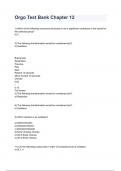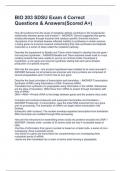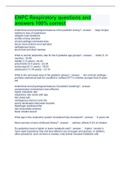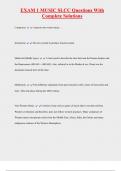Validity of wills and codicils
Testamenta Banks v Goodfellow: A testator must be mentally capable of making a will. They must:
ry capacity 1. Understand the nature of the act and its effects; and
2. Appreciate the extent of the property of which they are disposing; and
3. Understand and appreciate the moral claims to which they ought to give effect; and
4. Have no disorder of the mind that perverts their sense of right or prevents the
exercise of their natural faculties in disposing property by will.
Timing
A testator must have testamentary capacity at the time the will is executed.
Parker v Felgate exception:
1. They had testamentary capacity at time of instructions to make the will.
2. The will was prepared in accordance with those instructions.
3. At time of execution, they understand they are signing a will for which they previously
gave instructions.
N.B. Testator may have fluctuating capacity or temporary lack of capacity.
Golden Rule
When taking instructions from elderly/seriously ill clients:
1. A medical practitioner should assess the testator’s capacity; and
2. A contemporaneous record of the assessment and conclusion should be made.
Presumption of capacity
Capacity is presumed if the will appears rational and has been duly executed. There must be
sufficient evidence to raise doubt when challenging a will on the grounds of lack of capacity.
Duress and Where the whole Will was made as a result of undue influence/duress, the will is invalid.
undue
influence Where part of the Will was made as a result of undue influence/duress, the remainder may be
given effect provided that omissions do not upset the whole tenor of what remains, but the
court cannot add or substitute words.
Undue influence requirements
Re Edwards:
A testator is coerced into making a will/particular terms.
o Coercion goes beyond persuasion.
It is a is a difficult to prove question of fact.
Burden of proof is on person making the allegation.
Physical and mental strength of testator are relevant.
Fairness of the will is irrelevant.
Formal s.9 Wills Act 1837:
requiremen
ts a It is in writing and signed by the a) Includes handwritten and typed text in
) testator or some other person in their any language.
presence and by their b) Any mark constitutes a signature if
intended by the testator, but it is
preferable that the testator use their
normal signature.
b It appears that the testator intended by c) Signature at end of will = necessary
) their signature to give effect to the will. intention.
d) Signature at beginning/middle =
problematic.
c The signature is made or e) A testator either signs in person or
) acknowledged by the testator in the acknowledges the signature of the
presence of two or more witnesses signature of the person who signed on
present at the same time. their behalf.
f) Two is the minimum – there is no
maximum.
g) Witnesses must be physically and
mentally present.
h) The full name, address, and occupation of
each witness should be noted in case the
will is challenged.
, d Each witness either: i) Both witnesses must sign the will in front
) i) Attests and signs the will; or of the testator, but it is not necessary for
ii) Acknowledges his signature, in each witness to also sign in front of each
the presence of the testator, other.
but not necessarily in the
presence of any other witness.
Attestation
Describes the circumstances under which the will was executed. Should be used in blind,
illiterate, signed on behalf of circumstances.
Personal representatives
The An executor is a personal representative appointed by will.
appointme
nt of Only one executor is required, even if there are minor, or life interests that arise, but for
executors practical reasons, it is common for at least two to be appointed.
A testator may appoint as many executors as they like in the will, but a maximum of four
people can be named on the grant.
If not all the executors are applying for grant of probate, those continuing with the application
will need to explain to the probate registry why not all of those named are applying.
Chain of representation
s.7 Administration of Estates Act 1925: The executor of last surviving executor automatically
becomes executor of OG testator’s estate without an additional grant if no personal
representative remains.
Renunciati Renunciation
on and An executor may formally renounce their right to apply for probate and the administration
reservation continues as though they had not been appointed.
of power
To do this, the executor must sign a form of renunciation which must be submitted to the probate
registry as evidence of why an executor appointed is not making the application. This will be
noted on the grant when it is issued.
This is final and the executor cannot change their mind without court approval.
N.B. An executor cannot renounce if they have intermeddled with the estate and the court will
not accept an attempt to renounce.
Reservation of power
If an executor does not want to act initially and will not apply for the OG grant, but wants to
retain the option for probate later, they may reserve the power to do so.
To do this, there must be at least one other executor who does take out the grant of probate.
This other executor must give notice of their intention to apply to the executor to whom power
is reserved. Under Rule 27 NCPR, the reservation of power will be noted on the grant.
To act later, the executor who reserved power can apply for a grant of double probate to run
concurrently with the OG grant, but applying for this is only appropriate if the administration is
not yet complete.
N.B. An executor can reserve power if they have intermeddled with the estate.
Intermeddling: When a person takes steps indicating acceptance of appointment. Acts of
common humanity (arranging funerals, securing estate assets etc.) do not amount to
intermeddling.
Alterations and amendments to wills






